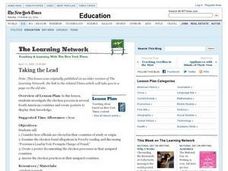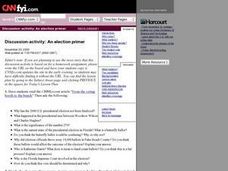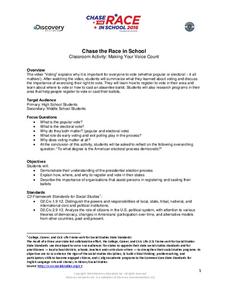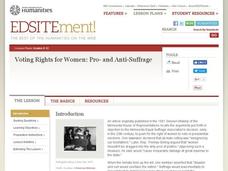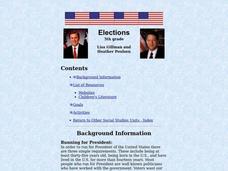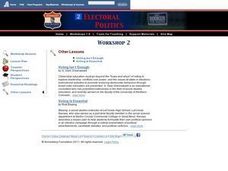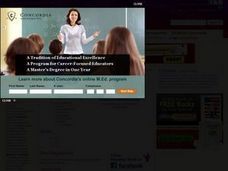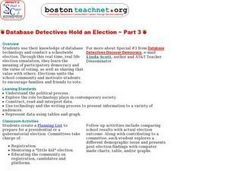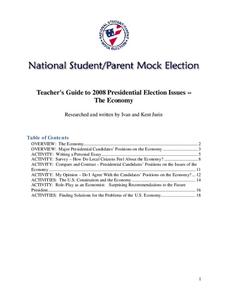Curated OER
Let the Campaign Begin
Young scholars differentiate between positive and negative personal attributes and select a fictional character for nomination who personifies the qualities of a good leader. They use the Internet to learn about the election process and...
Curated OER
Taking the Lead
Students discover how officials are elected in countries of interest to them. After reading an article, they examine election fraud allegations in Peru. They create a poster showing the election process and assess them in a written essay.
Curated OER
What is a Democracy?
Students identify what makes a country democratic and compare United States and Indian political party symbols. They create their own political party and party symbol. They create a campaign speech, participate in the voting process...
Curated OER
The Final Countdown
Students examine the United States electoral college system as it applies to the 2004 presidential election. They investigate the impact of the twelve battleground states in the 2004 election and develop informative pamphlets on the...
Curated OER
It's Up for Debate
In this lesson, students investigate the different platforms of each of the Presidential hopefuls for the 2000 election. Small groups each carefully research the platforms of an assigned candidate and then create a political pamphlet...
Curated OER
Electronic Elections
Learners evaluate the role of voting in democratic societies and the potential of voting on the Internet.
Curated OER
Analyzing the 2000 Election
Students research and analyze the year 2000 presidential election results. They identify the reasons this particular election was so unusual and predict how voting outcomes might affect their communities, the country and the world.
Curated OER
Discussion-Activity: An Election Primer
Students research and discuss the 2000 presidential election. They role-play Al Gore's and George W. Bush's legal teams, and members of the Florida Supreme Court. They of each legal team present their arguments to the Supreme Court.
Discovery Education
Making Your Voice Count
As learners watch a video on voting, they take notes on a worksheet that lists various voting topics, including electoral and popular votes, early voting, and exit polling. Then, young people research the Internet for their state's...
Curated OER
Voting Rights for Women: Pro- and Anti-Suffrage
Students examine the arguments for and against suffrage for women in the 19th and early 20th centuries. They explore various websites, read and discuss primary source documents, develop a document from two points of view, and analyze...
Curated OER
Elections
Fifth graders examine the voting process, the electoral college and the voting process. They identify qualities important to a president. They fill out ballot sheets and study the registration forms.
Curated OER
The Election
Students participate in an election. They are asked to vote for one of four candidates without knowing who they are or what they stand for. Students gain an important lesson when voting to make sure that security of freedom and...
Stanford University
The 1898 North Carolina Election
Pupils discuss why the Democrats defeated the Fusion ticket in the 1898 North Carolina election. In this content area reading instructional activity, learners explore three primary documents and answer guiding questions that help them...
Curated OER
Voting Isn't Enough
Students compare and contrast their perceptions of politicians and leaders, analyze the consequences of negative public perceptions of politicians, and develop solutions to the problems caused by negative attitudes toward politics.
Curated OER
Growing Voters and Election 2004: Classroom Debate
Young scholars research the issues and platforms of candidates and separate propaganda from process in order to choose a candidate to support. Students examine political parties and their contributions to shaping the foundation of the...
Curated OER
Primary Process in Elections
Students read "How Does the Primary Process Work" and complete the accompanying worksheet. They explore how the primary and caucus process works in small groups or in pairs. They answer questions based on the primary process to...
Curated OER
Why Bother To Vote In Florida?
Fifth graders gain knowledge about the Florida 2000 Presidential Election, proposed changes in the process, and to practice communication skills, including listening and speaking. This lesson really gets at the heart of the changes made...
Curated OER
Database Detectives Hold an Election ~ Part 3
Students use a database to conduct a schoolwide election. They discover the importance of voting and democracy. They incourage one another to vote.
Curated OER
Election Results Map
Students use election night returns to create a map of the results. They can represent popular vote results or electoral votes received. They use the internet to gather information about the electoral college and results.
Curated OER
Proportional Representation: A Fairer Voting System?
Tenth graders work as a grade to conduct a mock election. They tally votes in two different systems and discuss if proportional representation or straight counting of votes leads to a fairer outcome.
Curated OER
The 2004 Presidential Election
Young scholars examine the 2004 Presidential election between George W. Bush and John Kerry. Using a variety of primary source documents, they discover where the candidates stood on the issues. In groups, they create a tableau in which...
Curated OER
Teacher's Guide to 2008 Presidential Election Issues: The Economy
Students discuss the 2008 Presidential election. They examine the significant issues of the election and focus on the economy. Students study the major issues with the economy. Students decide how they feel about each canidates' views...
Curated OER
Lesson Plan: Bringing Out the Vote
Pupils explore voter turnout, analyzing why Americans don't vote, and citizen activism through creating community publicity about the 2004 Presidential election.
Curated OER
Voting Adventure
Students discover the requirements they need to be able to vote in a democracy. Using that information, they discuss the importance of voting in an election. They use the Internet to analyze voter participation numbers in their county....



